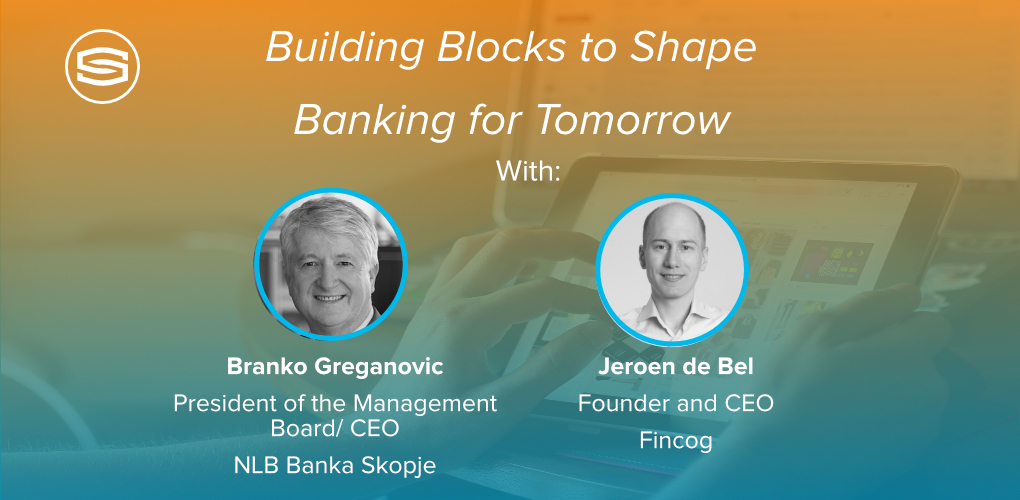
Insights & Opinions
Building Blocks to Shape Banking for Tomorrow
Mon, 24 Oct 2022


That is the question to which Fincog tried to find an answer based on interviews with thought leaders and game changers in the banking industry. On October 20, we invited Jeroen de Bel to discuss the key findings.
He also brought a friend, Branko Greganovic, President of the Management Board and CEO of NLB Bank Skopje subsidiary of the Slovenian NLB Group. Branko is an executive with more than 30 years of experience, including 10 years in the banking industry.
If you like to read the full report of Fincog, you can find it here. For this blog, I decided to limit it to my learnings of the session.
Banks learned from Fintech Companies
Obviously, Fintech companies had, and still have, a tremendous impact on the banking industry. New companies are founded daily to solve a particular problem or issue in the industry. The good days may be over; still, the report, published in September 2022, spoke about an estimated 26,000 Fintech companies worldwide.
Fintech companies have challenged banks to improve their services. Although today, Fintech companies seem to be the ones that are being challenged on their business model, they keep banks sharp in improving their products and services in favour of their clients.
Collaboration is the way forward. Banks have a loyal client base, and Fintech companies have the solutions to help banks build a customer-centric organisation. Many of these Fintech companies started in a B2C model. They pivoted to a B2B model as they understood that having the best customer experience is not always enough to build a financially sustainable business model.
Branko: "Incumbent banks put a lot of effort into digital transformation. But I think they underestimate the challenge of digital transformation. Digital transformation is about moving the banking business from the physical world to the digital world. That's a much tougher challenge than we sometimes realise because it's a complete change of how to find the clients and build a relationship with them."
Although most bank clients can find their way in a digital environment, some may not, and they cannot be excluded. That means that banks in a digital transformation need to manage their clients at two speeds. On top of that, they have a profitable business, and incentive systems are not built to favour a digital transformation, which is about future incentives.
"Most of the incentives consistently work against digital transformation, against moving to the digital world. It is a classical innovators dilemma in which you have to jump from one technological S-curve to another one", said Branko.
Using data and technology for a customer-centric organisation
So banking for tomorrow requires a change in the mindset of higher management and collaboration with other organisations.
Work on what you're good at and find partners to solve the rest. Adding more partners brings more data. More data bring better insights. That is: if a bank can manage that data, and that is a challenge for most banks.
Branko's advice was: "Move your data as quickly as possible to the cloud in an architecture where data storage is completely agnostic towards applications, processes, functions, BI tools, what have you."
Management will need to at least understand the basics of tomorrow's foundation of banking business to complete that journey successfully. Branko: "Moving into the digital world requires a certain level of technological awareness, especially in the area of data management. You can no longer be a C-level executive without being a bit data management savvy, without understanding how data is used in the organisation and how it is stored, applied, and translated into tables, visuals and insights. You don't need to be a data scientist, but you need to understand the logic of the architecture."
What's Next: Crypto Assets and Sustainable Finance
The report didn't give much attention to crypto. Although we are in a crypto-winter right now, it surprised me a bit. Jeroen acknowledged that and argued that it remains fluid today in which direction banks should look to find the real value of crypto assets.
Jeroen: "We're still searching for the best use case. Clearly, there is value in international money transfers, particularly in regions with unstable traditional currencies, or in trade finance, but the industry is still looking for the silver bullet. I do believe in it, but it's just too early to fully understand the potential in the context of banking for tomorrow."
Branko joined the conversation by stating that crypto actually is not a financial but a real asset, and is there to stay as an asset class in the future, although a highly volatile and high-risk asset class. As a high-risk asset class, it is unlikely to perform all the functions of money required to be accepted as a currency.
As much as we like to talk about how technology is changing the industry, anno 2022, we cannot ignore ESG, which fundamentally changes banks, and how technology is used. Jeroen was clear on this: "It's nice to say we're green, but over time, people will demand more. It's no longer something that you can distinguish yourself with. It became a baseline, or foundation, for banks."
He explained how banks have a role to play in the change to a more sustainable society. That will impact not only their financing activities but also the valuation of assets on their balance sheet and, consequently, their future financial results.
"We must take a more dynamic view towards green investing and financing, based on economies having realistic and viable trajectories to move to a sustainable state", explained Branko, "Now, a lot of times, we are stopping financing something which obviously is, not sustainable in the long run but which the economy still heavily depends on".
Conclusion
The transformation of our industry is not over yet, it is only taking another form. As Jeroen said: “Markets are becoming more competitive. And as a bank, you need to keep up. This is really a scenario of eat or be eaten”.
Technological possibilities are endless, and banks need to decide wisely how to use it, where to invest in and who to partner witness to ensure their business remains to bring value to their customers, stakeholders and society at large.